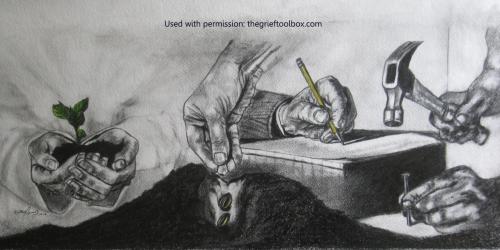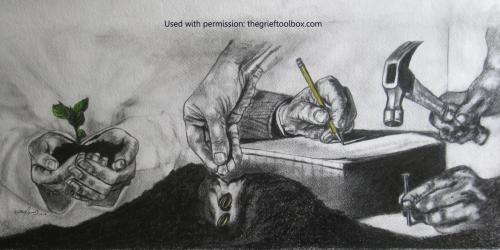Storm Damage to the Garden

Storm Damage to The Garden
You may have heard the expression “God picks the prettiest flowers from His garden”. Most people who find themselves in the pangs of grief are not comforted by this somewhat trite and archaic expression. I do not believe in a God that “picks flowers”. I believe that God loves to watch them grow, bloom and nourish our planet. I do not believe in a God who takes our loved ones or sends lightening bolts into our lives. I believe in a God that receives our spirit and comforts us in our sorrow.
We are the flowers, we are the weeds, the earth is our garden, that provides for our needs; God is the sun, the wind and the rain, God doesn’t pick anything and doesn’t cause pain; He doesn’t snatch up flowers or remove unwanted weeds; our Creator only tends our garden with love, it is we who plant the seeds; we are the flowers, we are the weeds; all a part of God’s plan, all with different needs.
Using a garden as a metaphor for life can also describe our grief; it inherently implies that we shall grow from the experience. Should we not be compensated somehow for our devastating loss? Growth in spirit, growth in understanding can only be a good thing. Growth provides for others and adds color to the world and to our life. We would never in our “right” minds ask for the experience of losing a loved one to death to grow spiritually in our life, but we do have a choice in how we react to that reality should it occur.
The world is a dangerous place to live in; No one is safe. No one is immune to death. It is the cycle of life; we are the garden, we are the gardener. We accept its seasons; we accept its harsh conditions. We do the best with what we are given. To live is to grow. To thrive is to survive.
We can do everything right in tending to our garden, adding the right nutrients to the soil, watering just enough and removing every weed. We can plot very carefully, allowing the right amount of sun, providing support for its vines and shade for tender shoots. We can protect it from varmints and spray for bugs, dust for the aphids and pick off the slugs. We can do everything possible to nourish and protect our garden, and one storm, can take it all away. Do we start all over again or let it go fallow? We have choices.
When our beloved dies, it’s like the straight line winds that flatten a garden. The whole garden is affected. Some parts may never recover, some plants stand alone outwardly unscathed by the powerful winds. Some plants, after a few days, are seemingly pulled up right by the powerful rays of the sun. Some varieties come back from the root; some are taken with the wind and will set roots in new ground. Some plants may grow bigger with no competition for the sun. Some plants without the shade of others will find themselves withering in the bright unyielding sun. The whole landscape of the garden changes following a storm. The garden will never be the same as it was, but it can bloom again and those plants that survived will be stronger in the weak places.
As a garden grows in size it must become a cooperative garden, with many gardeners that contribute to a bountiful crop. This means accepting help from resources outside our self. We soon find that we are not alone, we are many and we are connected. There is an African saying, “it takes a village to raise a child”; I believe it also takes a village to grieve a child or grieve someone that we love. We have choices in our grief. There is help.
Following the storm, following our loss, we have every right to run blindly screaming for help. We find that we need to reach out to our village and global community to help tend and repair our damaged garden.
In accepting the compassion of others a natural bond is formed; a silent partnership of sorts. We find that we need to depend on others for those times when we cannot function. Each one of us discovers that we are on a unique journey; a journey that we did not choose. Sometimes in the struggle to survive our journey we may miss or even dismiss the grief journey of others who are holding us up. In our great pain we could not see their pain; when our cup is not full we cannot fill the cups of others. Forgive us for we are in survival mode.
When we are in transition from survival mode to coping mode, we may find we are a bit stronger. We can assess the collateral damage around us and ask ourselves: Who else incurred damage from the storm? Which of my siblings have I not really “talked“to in while? Who should I call and thank for their support? How is my loved one’s best friend doing who looked so damaged from the loss? If the loss is your child, call the Auntie who almost claimed your child as her own; call the boss who always plopped your child on their knee and pulled a magic coin from their ear. Not only do others feel your sorrow and your loss, they grieve as well.
After the storm many gardens are damaged; we are not alone in our loss. Take time to reach out - in reaching out to others our hearts become connected. A bond, a nexus of compassion takes place and we are fortified as are they. They too, want to talk of their loss and the grief that together you share. They too need to heal and plant seeds of hope for better days ahead. It takes a village to survive a storm; you need not have to do it alone.
Article Images




Comments